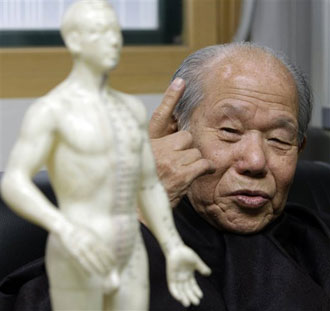Acupucturist Stirs Korean Debate on Herbal Medicine
Kim Nam-soo has stuck needles into generals, actors, tycoons and at least one president for more than six decades as South Korea’s acupuncturist to the stars.
Grateful patients say his treatments combining acupuncture with the ancient practice of burning herbs on the skin do as much good, or more, as Western medicine in treating everything from arthritis to diabetes, burns and even cancer.
But Kim shut his practice down in late 2008 amid a dispute with South Korea’s powerful medical establishment, which says he’s not licensed to administer moxibustion. On Thursday, the Constitutional Court narrowly sided with the medical board and rejected a petition seeking to allow longtime traditional medicine practitioners such as Kim to ply their trade as licensed therapists.
South Korean elderly patients are treated with acupuncture and moxibustion, in Seoul, South Korea. (AP Photo/ Lee Jin-man)
The case involving the nation’s most-famous acupuncturist has brought attention to the growing calls to ease restrictions on alternative medical remedies.
Kim, 95, received his license to administer acupuncture, the ancient remedy of inserting needles into the body to stimulate the circulation of blood and the flow of energy, in the early 1940s when Korea was ruled by Japan.
Over the years, Kim became famous for complementing acupuncture with moxibustion, a popular technique that involves placing smoldering herbs on acupuncture points. Many consider moxibustion a relatively easy remedy that some people do on their own at home.
Among his clients: Kim Jae-kyu, the ex-intelligence chief who assassinated then-President Park Chung-hee, a former army general who ruled South Korea with an iron-fist for 18 years, at a party in 1979.
He recalled that he was summoned for a top secret appointment in the 1990s to treat then-President Kim Young-sam for a torn calf muscle sustained while jogging.
“After getting my acupuncture, he was OK — and called me the ‘one-shot acupuncturist,’” he told The Associated Press.
He said he also nursed Unification Church founder Sun Myung Moon back to health when the preacher was injured in a helicopter crash in 2008.
Kim may be skilled at acupuncture and moxibustion, but he was practicing illegally because he doesn’t have a license to administer moxibustion, the Korean Oriental Medicine Association in Seoul said.
“Likewise, you might find that a man can drive a car well even if he doesn’t have a driver’s license, but that doesn’t make it legal,” said Kim In-bum, vice president of the medical association.
In South Korea, graduates of Oriental medical schools who pass government-run exams and about 40 remaining colonial-era therapists are licensed to practice both acupuncture and moxibustion. Kim Nam-soo is only licensed for acupuncture.
His popularity, despite operating illegally, has won him some enemies among some licensed practitioners who call him a glory-seeker who inflates his skills and accomplishments.
In late 2008, the Seoul government imposed a 45-day ban on Kim’s medical activities in response to two complaints, including one reportedly filed by a licensed practitioner.
Kim closed his doors in protest, and one of his students appealed to the Constitutional Court for the right to administer moxibustion even without a license.
“Why do medical professionals exist? Shouldn’t they reduce their patients’ pains by doing whatever they can do?” Kim said. “We may not have a valid license, but we are still qualified to treat people. Our skills are something that we can be proud of even on the world stage.”
Over the years, the Constitutional Court consistently has ruled against acupuncturists like Kim, typically unanimously. This time, however, five of the court’s nine judges voted against the law, just one ballot shy of the six-vote requirement to revise it.
The surprise results prompted calls to rethink the law. “It was a message to the government and parliament on the need to revise the law to guarantee the people’s rights to choose their own medical treatment,” court spokesman Noh Hee-bum said.
“The Constitutional Court’s ruling has given the government an assignment that we hope it will complete: to revise an antiquated law,” the JoongAng Ilbo newspaper said in an editorial Saturday.
The Ministry of Health said it plans to review the controversial ruling.
The medical association issued a statement expressing “shock” that five judges ruled against the law, reiterating that only authorized doctors should perform the treatments.
Kim, buoyed by the ruling, said Friday that he will resume practicing acupuncture and moxibustion.
“If they send me to prison for practicing without a license, I’m ready to go,” he said. “I’ll cure patients at prisons with acupuncture and moxibustion.”
HYUNG-JIN KIM, Associated Press Writer SEOUL, South Korea


